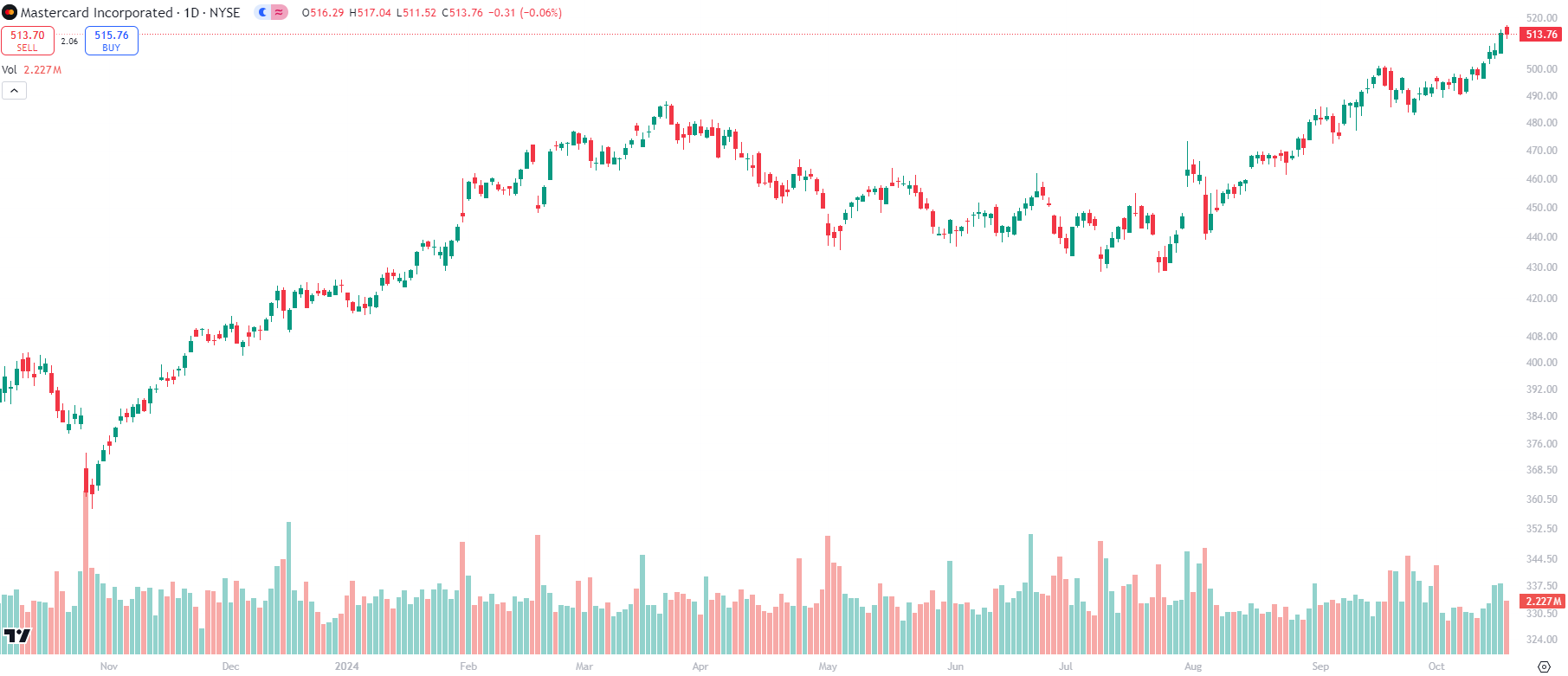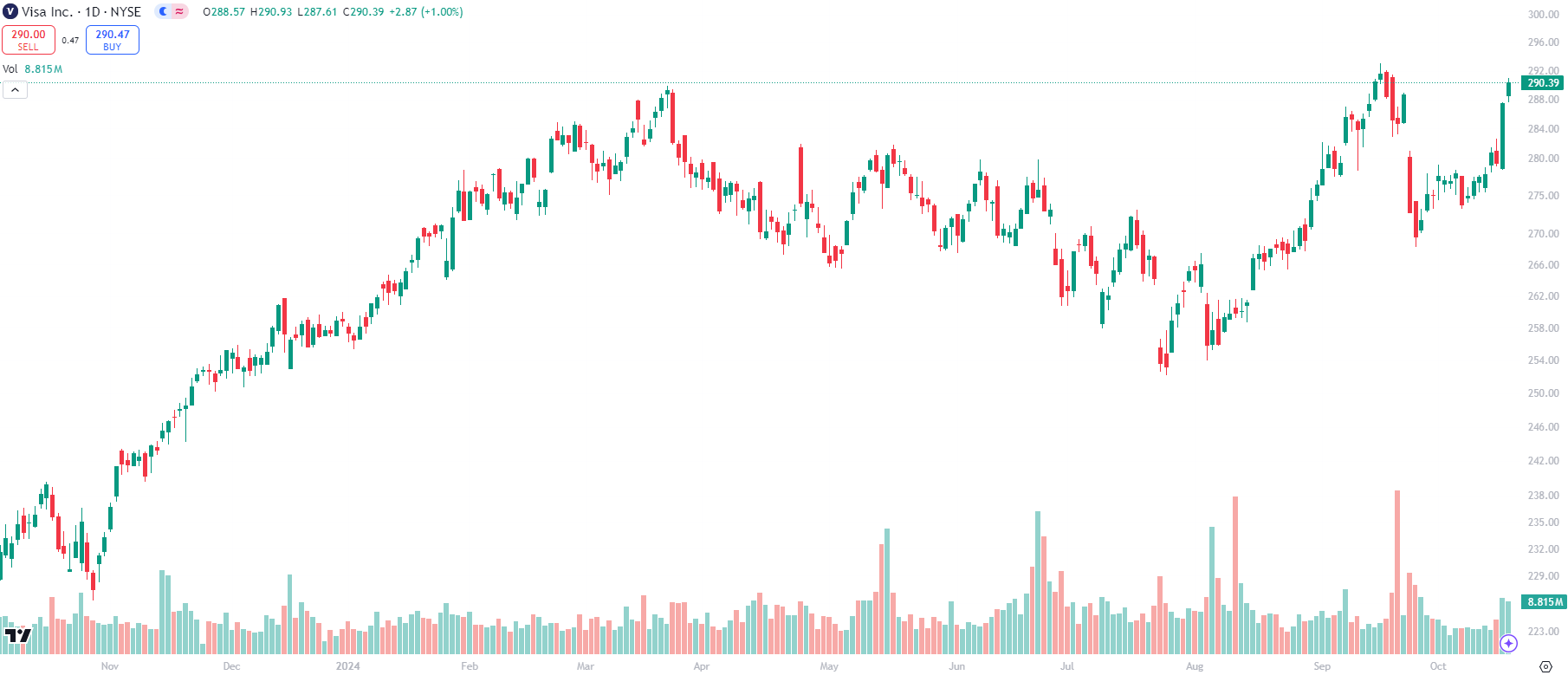Mastercard or Visa? Which of these 2 stocks appears more attractive?
Nick Sundich, October 21, 2024
Should you invest in Mastercard or Visa? It is a difficult question for investors to answer. These payment giants hold a virtual monopoly over the global payments system – American Express is a decent sized player, but is still no match for Mastercard (NYSE:MA) and Visa (NYSE:V).
The companies, headquartered in Purchase (in New York State, an hours drive north of downtown Manhattan) and San Francisco respectively, have their logos on the majority of the world’s debit and credit cards. They have some ancillary services such as cross-border transactions and risk-management solutions, but cards remain their core businesses.
It is important to note that the companies do not issue them directly to their partners but through member financial institutions. Their names and branding may appear to be their only difference, but we thought we’d take a deep dive on them to see if this really is the case.
Operating model
The companies have slightly different models. Visa charges service fees to the issuer based on card volume. But Mastercard negotiates and calculates service fees as a percentage of global dollar volume. Both offer 3 card levels and this determines the level of service that consumers get, because they get the cost passed on in the form of credit card fees.
The card issuer sets the card’s terms and conditions, including fees, rewards and other features. The issuing bank is responsible for underwriting, interest rate structuring, and the full development of rewards programs. All transactions are processed at secure data centres.
How are they going?
Both companies are sitting on 2000% gains since their mid-2000s IPOs. Considering more recent times, Mastercard is up just under 30% in a year, while Visa is slightly behind with a 21% gain as at October 18, 2024.

Mastercard (NYSE:MA) share price chart, log scale (Source: TradingView)

Visa (NYSE:V) share price chart, log scale (Source: TradingView)
Nonetheless, Visa remains valued at US$100bn more and at 26x P/E for CY25 while Mastercard is just under 25x. Analysts covering the companies are more confident in Visa, with a mean 12-month target share price 6% above the current price, while Mastercard is 6%.
In 2023, there were 266 billion transactions with Visa payments equating to US$13tn. Mastercard made 171bn transactions equating to $9tn. Mastercard actually trails China’s UnionPay which made 228 billion transactions, but all 3 are well behind American Express’ 11bn transactions. UnionPay is in a unique position because it is the only interbank network in China that links all the ATMs – but that’s for another article.
So is it Mastercard or Visa?
We are going to say Mastercard. It is a very close call and we think investors in neither stock will go wrong. But if you have to make a judgement call, we think Mastercard has slightly higher growth prospects.
It already has a smaller market share but has potential to grow more, and analysts think it will. We already mentioned its target share price is a higher premium to the current share price compared to Visa. But its earnings are expected to grow by a CAGR of 16% up to 2028, whilst its revenues will grow by 11% over the same time frame. The same figures for Visa are 13% and 9% respectively.
But how will it grow? Analysts think it will be through its growing acceptance in developing countries, particularly the Middle East and Africa. To this end, Mastercard has entered into strategic partnerships with Amazon and Kenyan telco Safaricom. Another recent development is its US$2.65bn purchase of threat intelligence firm Recorded Future. The pair of companies have already collaborated on an AI-based service that can warn banks when a card has been compromised. This could help it stand out against Visa.
So investors have reason to be slightly more optimistic about Mastercard shares compared to Visa shares.
What are the Best ASX Stocks to invest in right now?
Check our buy/sell tips
Blog Categories
Get Our Top 5 ASX Stocks for FY25
Recent Posts
The $3m super tax is coming! If you’re invested in equities, here is how it might impact you
It seems during the next 3 years, the $3m super tax will be officially a thing. Itwas blocked by the…
Northern Star Resources (ASX:NST): The $28bn gold miner that stands above them all
Northern Star Resources (ASX:NST) is by far the largest gold company on the ASX, capped at $28bn as of May…
6 ASX stocks you forgot were listed
Here are 6 ASX stocks you forgot were listed Brisbane Broncos (ASX:BBL) No it is not a mistake. This…



